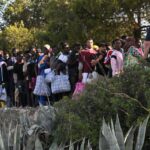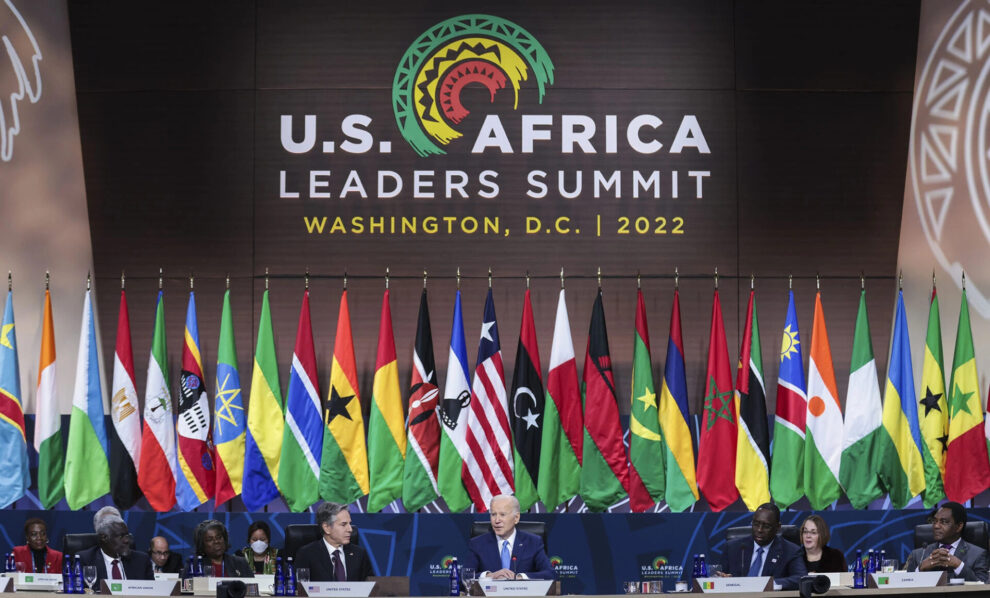The US has sought new ways to re-engage with Africa as part of efforts to counter the influence of both China and Russia on the one hand, as the 2022 US National Security Strategy clearly notes, but also to secure its own national interests and strategic relevance, in the wake of unprecedented challenges such as the threat posed by violent extremist groups on the continent.
In the Sahel for instance, France’s decision to bring an end to its military operations in the troubled region, has created a “policing gap” of which Russia has stepped in to fill. Russia’s private military contractors, particularly the Wagner group, have garnered a ruthless reputation for extrajudicial killings.
Despite this, some of Africa’s autocratic leaders appear more comfortable doing business with the Russians and the Chinese.
The US-Africa Leaders’ Summit
In December 2022, US President Joe Biden convened the second edition of the US Africa Leaders’ Summit, which took place in Washington DC. During the event, which had 46 African heads of states and governments in attendance, including the chairman of the African Union (AU), the US pledged $55bn in financial support to the continent over the next three years towards achieving the goals and objectives of the AU’s Agenda 2063.
Like the US, China, for instance, has also convened several Forums on China-Africa Cooperation (FOCAC). In 2021, during the FOCAC, China pledged $40bn in financial commitments to Africa.
Russia has sought to strengthen its ties with Africa through its Africa Summit, which took place in Sochi in 2019, where it offered nuclear power plants, fighter jets and missile defence systems amongst others, to the different countries on the continent, in $12.5bn worth of deals.
Beyond the US’s financial pledges, made during the ALS 2022, it remains to be seen whether these will yield any significant results, despite the appointment of a Special Representative to drive implementation, and the subsequent high-profile visits of the US Treasury Secretary Janet Yellen and the US envoy to the UNSC to Africa, Linda Thomas-Greenfield post ASL 2022 as part of efforts to step up overtures to the continent.
President Biden is also expected to visit the continent this year, making it eight years since a US president visited since President Obama did in 2015.
Africa Insight
Wake up to the essential with the Editor’s picks.Sign upAlso receive offers from The Africa ReportAlso receive offers from The Africa Report’s partners
Africa at the United Nations Security Council
Given that a significant portion of debates in the UN focus on issues in Africa, the continent’s minimal recognition in global multilateral fora, attests to some of the injustices meted against it.
An important highlight of the ALS 2022 therefore was the reiteration by the Biden administration to support Africa’s quest for a permanent seat in the United Nations Security Council (UNSC).
Taking this a step further, the US also formally announced its support for the African Union joining the G20 as a permanent member. Having attended the ALS 2022 myself, one can attest to how these gestures by the US could potentially mark a new era in American-African relations in the age of great power competition.
However, these pledges of commitment only serve to reinforce the dependency syndrome that Africa has become accustomed to, yet failed to break free from, as a legacy of colonialism.
Getting Africa from where it currently is to whether it ought to be as a political and economic powerhouse will not be achieved through handouts and bailouts. Focus rather should be on teaching Africa to ‘fish’ rather than giving it ‘fish’.
Seeing Africa with a new lens
Doing this requires a departure from how the continent has been perceived overtime by the US and its Western partners.
Emphasis on mutual respect and strengthening cooperation need to be accorded the priority they deserve in building a viable and sustainable relationship that transcends beyond its leaders alone, but one that also connects with its people.
Africa’s economic transformation will not come from external actors like the US, China, or Russia, who’s strategic interests are bound to oscillate according to the demands of the times. A more sustainable approach that does not see Africa as a destination of aid and “financial commitments” is one that places emphasis on its states’ capacity building, which is fundamental towards their abilities to respond to internal cris[e]s.
This includes helping to address some of the underlying issues on the continent that have fuelled state weakness and state fragility. Some of which include endemic poverty, high inequality, high illiteracy and unemployment rates, political marginalisation, ethno-religious sensitivities, and climate related issues to mention a few.
For this to be successful, the voices of the most affected, which are Africans themselves, and not their leaders who live in opulence, must be heard. This would go a long way in fostering local ownership of the transformative process that the continent and its people have long yearned for.
What’s the missing link?
While it took close to a decade to convene the second ALS, after the first one was held in August 2014, one cannot ignore that the recently concluded gathering of political heavyweights appears to have been informed by the fear of missing out on the “new scra[m]ble” for Africa.
Africa and Africans do not have to wait for another eight years until another set of promises are made to it.
They must be willing and ready to take the lead in actualising the transformation they aspire for. Until the issues alluded to above are squarely addressed, Africa would likely remain an attractive destination for violent extremists thereby solidifying Russia and China’s continued adventurism into the continent.
Countering the influence of both powers will not be done by US handouts or bailouts, rather it will be by equipping Africa with the tools to address its own challenges.
Until this is done, additional summits hosted in Washington are bound to make little or no difference in a continent that is fraught [with] the realities of the changing times. Therein underlies the essence of the missing link in US Africa relations, in the age of great power competition.
Source : TheAfricaReport
















